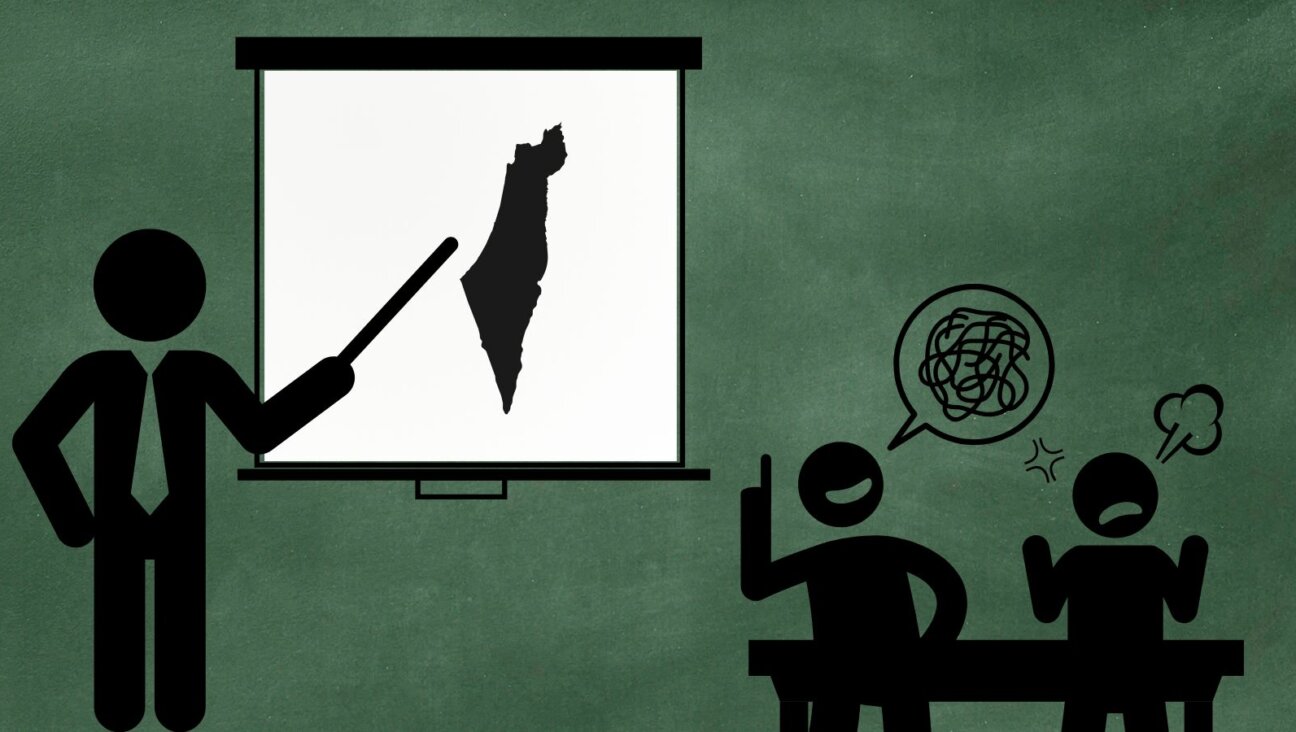Angels & Demons
On the eve of the release of Freida Lee Mock’s new documentary “Wrestling with Angels,” a glimpse into the post-9/11 world of playwright/activist Tony Kushner, the Forward’s Gabriel Sanders caught up with the writer to see what he thought of the film. One problem: Kushner can’t stand seeing himself on tape and hadn’t yet brought himself to watch it. “It’s not like I think I’m hideous or anything,” he said, “I just don’t like the way I look or sound particularly.” And so, the conversation shifted elsewhere: to spontaneity in acting, writerly solitude and the spiritual costs of the literary life. In between, the Forward told Kushner a little bit about his movie.
Gabriel Sanders: Beyond the matter of not wanting to see yourself onscreen, did you have a philosophical reason for not watching the film?
Tony Kushner: Over the years, I’ve done a lot of speeches and Q&A things on college campuses, and I enjoy doing them, and I don’t want to be self-conscious when I do them. Watching myself might make me start to quote myself in a certain way. This happens with people in film. Actors, for centuries, did what they did and never saw themselves. I think what happens today is that actors begin to do an imitation of themselves. They see themselves do something really good and the next time they’re up on stage they say, “Oh, how did I do that? Let me try to do that again.” And you begin to move farther away from something that’s spontaneous.
GS: Even if it wasn’t your coinage, I was hoping to ask you about the title of the new movie, “Wrestling with Angels,” a play on both the title of a book of essays you co-edited called “Wrestling with Zion” and your play “Angels in America.” I suppose the title is meant to equate you with the biblical Jacob, who wrestles with an angel and survives, albeit with a wounded hip. If indeed you are a Jacob, what is your wound?
TK: Actually, there’s a scene in “Angels in America” that specifically evokes Jacob’s wrestling with the angel, but there it’s the angel that gets wounded.
GS: Turning the tables. But still, would you say that making art exacts a price, a wound?
TK: Many of the artists I admire seem in some ways to have been killed by the work that they produced. When you look at what Eugene O’Neill produced in his life, especially his last four plays, you see that they sort of hollowed him out. There wasn’t anything left when he died. You think of Shakespeare dying at a very early age, you think of Brecht dying at a very early age. I admire it, and yet it’s scary to me. I do feel that there’s no feeling better on earth than having finished something that you set out to do, like a new play. It’s also exhausting, at least for me it is. You feel depleted. You feel like you’ve taken some part of yourself and deposited it on those pages and you’re not necessarily going to get all of it back. You get other things back and in other ways you’re replenished and fed by your work, but I do have a fear that what I’m giving away won’t come back. I think that’s one of the reasons that it’s hard for me to write.
GS: In the film, you say that after the giant New York anti-war rally of February 15, 2003, at which you made a speech, you were in a foul, foul mood and that it was from that mood that your play about Laura Bush and Dostoyevsky, “Only We Who Guard the Mystery Shall be Unhappy,” was born. In the movie, you come across as nothing but charming and upbeat. When does the moody part of you rear its head?
TK: I’m not a very depressed person. I’m not particularly happy being unhappy. I know people who rush to it and embrace it, but I don’t. What’s filmed in the movie is me in rehearsal, making speeches and signing books. The moodiest, cloudiest times are when I’m writing. What you have to do when you’re in the process of writing is lower your immune system, lower the walls, so that you can become a little more porous, a little less yourself. You stop being the distillation of yourself that’s the performative part of you and you try and see who else is in there and what they sound like, which is where characters come from. I’m much less fit for human company. It’s a dilemma that’s classic for playwrights more than for any other writer, because we have this strange dichotomous existence: We have to go between the privacy of the writing room and the rehearsal room.
GS: Getting back to the film, I should say that it’s an incredibly laudatory portrait, from start to finish. If anything, you come across too well. I almost want to see some warts.
TK: You can come over to my apartment and I’d be glad to show you my warts.
GS: Doesn’t Freida Lee Mock deserve to see that you haven’t been offended? Or maybe even that you’re pleased?
TK: I could tell from [my partner Mark Harris’s] reaction when he first saw it that there wasn’t going to be any cause for offense. Everybody seems to be very enamored of my father’s performance. Maybe I’d like to watch that. Maybe some day I’ll pour a drink and sit and watch it by myself.
GS: One of the most beautiful lines in the film comes from your father. It’s in a section of the movie about your coming out. He says he said to you, “If I were Tchaikovsky’s father, wouldn’t I be proud?” and then he proceeds to say to the camera that you indeed are a Tchaikovsky. Not only does he talk about coming to terms with your gayness, he gives you the single greatest critical endorsement one can imagine.
TK: Now I’m definitely not going to watch it.
A message from our CEO & publisher Rachel Fishman Feddersen

I hope you appreciated this article. Before you go, I’d like to ask you to please support the Forward’s award-winning, nonprofit journalism during this critical time.
We’ve set a goal to raise $260,000 by December 31. That’s an ambitious goal, but one that will give us the resources we need to invest in the high quality news, opinion, analysis and cultural coverage that isn’t available anywhere else.
If you feel inspired to make an impact, now is the time to give something back. Join us as a member at your most generous level.
— Rachel Fishman Feddersen, Publisher and CEO























